Editorial
Jab and flat-earthers

Tuesday 14th September, 2021
Social media, if properly used, can be a boon to a country, but in the hands of troublemakers bent on disseminating fake news, they could be as harmful, if not dangerous, as cut-throat razors wielded by mad monkeys. Unfortunately, some Sri Lankans tend to fall for baseless claims published on the Internet, hook, line, and sinker.
Reports that some Sri Lankan youth are wary of being inoculated against Covid-19 owing to false claims being circulated on social media about the vaccines have caused much concern to the health experts in charge of the national vaccination drive. The youth who fall for bogus claims that the Covid-19 jabs will adversely impact their libido and fertility, and therefore refuse to be vaccinated are making a huge mistake; they are exposing themselves to the danger of contracting Covid-19, which kills people of all ages indiscriminately. One’s libido and fertility do not survive one’s death, do they?
Anti-vaxxers are active on the Internet as never before. There is hardly anything these flat-earthers do not do to instill fear of vaccines into others. Their scaremongering is a threat to global health. What they believe in is the very antithesis of science, and nothing is stupider than to buy into their claims and remain unvaccinated.
What the Sri Lankan youth troubled by the jab scare, as it were, should bear in mind is that they have already taken several vaccines against viral diseases and benefited tremendously therefrom; they have been given the MMR vaccine, among others, to protect them against highly contagious diseases such as measles, mumps, and rubella. No harm has befallen them; instead these jabs have helped them remain healthy. It is science and nothing else that has enabled Sri Lanka to eradicate the polio menace. So, why fear vaccines that save lives?
True, vaccines could have some side-effects, which are rare, but impotence and infertility/subfertility are certainly not among them, medical experts inform us. There is an element of risk in almost everything—even in the act of crossing a road; does this mean people should stop walking on roads? There are rare instances where infants choke to death on mother’s milk, but this does not mean children should not be breastfed.
‘There’s a sucker born every minute’, American showman, P. T. Barnum, is reported to have said. This is a truism if the sheer number of gullible people amongst us is any indication. There have been numerous instances of mass hysteria in this country. Some years ago, many people claimed to have seen colourful rays emanating from some religious statues. When a carpenter turned self-proclaimed native physician claimed to have found a cure for Covid-19 with the help of a goddess, thousands of people went running to his village to buy his herbal syrup. Among those he took for a ride were the then Health Minister, the Speaker of Parliament, a large number of MPs and even some doctors. A national university went so far as to grant the untested product ethical clearance. So, it is only natural that there are many Sri Lankans who believe in false claims disseminated on social media about the Covid-19 vaccines.
During the last several days, we have seen young men and women queue up near vaccination centres in an orderly manner. They have earned praise for their exemplary behaviour, and set an example to the elderly folk who shove and jostle to receive vaccines, making a nuisance of themselves to the police and health workers.
The youth who are said to be wary of being vaccinated against Covid-19 owing to misconceptions and unfounded fears ought to emulate the aforesaid intelligent men and women, stop believing in non-science, and go running to grab a jab. That is the way they can prove that they are as smart as the mobile phones they carry, and not a bunch of flat-earthers.
Editorial
Crime and politics

Saturday 22nd February, 2025
The Sri Lanka police are known for their swift post-crime response, which however is selective in most cases. On Wednesday (19), they failed to protect an underworld character brought to the Colombo Magistrate’s court. Ganemulle Sanjeewa was shot while in the dock despite a heavy police presence at the court complex. Subsequently, he succumbed to his injuries in hospital. The assassin entered the courtroom, posing as a lawyer. In 2004, an underworld figure, Dhammika Amerasinghe was gunned down inside a courtroom at Hulftsdorp in a similar manner, and his killer was disguised as a law student. The police do not seem to learn from their lapses and blunders.
The NPP MPs never miss an opportunity to inveigh against their Opposition counterparts who were in previous governments that earned notoriety for using underworld gangs to do dirty work for them. The NPP is right in blaming the past governments for the rise of the underworld. Vilfredo Pareto has expounded the theory of the circulation of elites in power politics. In this country, regime changes lead to what may be called the circulation of underworld kingpins. This is how criminals such as Gonawala Sunil, Soththi Upali, Baddegana Sanjeweewa and Wambotta built crime syndicates under different governments.
Gonawala Sunil, a murderer serving a jail term for raping a teenage girl, was released from prison on a presidential pardon and used to unleash violence against the rivals of the UNP under President J. R. Jayewardene’s watch. Soththi Upali, a rapist and contract killer, became more powerful than the police, to all intents and purposes, under President’s Ranasinghe Premadasa’s government. He carried out a large number of attacks on the then Opposition with impunity. Beddegana Sanjeewa, a notorious killer, was appointed as a Reserve Police Inspector and recruited into the Presidential Security Division during President Chandrika Bandaranaike Kumaratunga’s rule. Wambotta, a much-dreaded killer faithfully served President Mahinda Rajapaksa’s government. All of them died violent deaths. There were countless other criminals working for powerful governments. One cannot but agree with the JVP-led NPP that the blame for the institutionalisation of political violence, and the rise of the underworld should be apportioned to the UNP, the SLFP, their coalition partners, and offshoots.
A part of the blame for the perpetuation of links between politicians and the underworld, and the culture of political violence should go to the public as well, for they have no qualms about voting for politicians with underworld connections. They have even elected some accused in murder cases to Parliament. It is said that the government you elect is the government you deserve. It may be people’s lenient attitude towards political violence that made them ignore the JVP’s violent past and vote the JVP-led NPP into power last year.
Making a special statement in Parliament, yesterday, Minister of Public Security and Parliamentary Affairs Ananda Wijepala said the police had arrested Ganemulle Sanjweea’s killer within eight hours of the incident. True, they did so, but that will not extenuate their failure to prevent a murder inside a courtroom. If it is true that the police arrested the murder suspect under their own steam, how come they failed to nab his female accomplice? She had not been arrested by yesterday evening.
Criminal gangs often squeal on one another either to remove their rivals from their path so as to dominate the underworld or to prevent the police from launching massive hunts when the perpetrators of high-profile crimes make good their escape. They often help the police make arrests for reasons of self-preservation. Perhaps, this is what happened after Wednesday’s courtroom killing.
Meanwhile, two policemen have been arrested in connection with the triple murder in Middeniya on Tuesday and the killing of Ganemulle Sanjeewa the following day. Another policeman who allegedly aided and abetted an abortive underworld operation to spring notorious criminal Harakkata free while being held at the CID headquarters, has been brought here from India, where he was arrested. A former Senior DIG has been sentenced to four years RI for having released a suspect arrested for the gang rape and murder of a schoolgirl, S. Vidya, in Pungudutivu in 2015, when he was serving in the North. A constable, who disappeared with his assault rifle has been arrested. There must be many more police personnel in league with criminals. Some military deserters and serving armed forces personnel have also been arrested for their underworld links. It has been revealed that Harakkata’s gang had hired several serving commandos to take part in their planned operation, which failed.
A country has its work cut out to rid itself of organised crime, when its politicians and rogue elements in the police and armed forces collude with the underworld, and the people vote for violent elements. So, the incumbent government should stop labouring under the delusion that the underworld can be neutralised in just months and double down on its efforts to achieve that end.
Editorial
Budget sideshows

Friday 21st February, 2025
A typical Sri Lankan budget debate is currently underway. The focus of most Opposition politicians is on the politics of the budget rather than its economics. Sideshows in the House usually eclipse the national budget.
The Opposition pretends to be scandalised that the JVP-led NPP government’s maiden budget is out of sync with the JVP’s core ideology. Its MPs are heard lamenting in Parliament that the NPP has deep-sixed the JVP’s original economic policies.
True, there is a world of difference between the economic principles underpinning Budget 2025 and what is stated in the JVP’s Revolutionary Policy Declaration published under Rohana Wijeweera’s leadership. However, times have changed. So has the JVP as well as other political parties. In fact, the Opposition and the public should be happy that the JVP has jettisoned its ideological shibboleths and come to terms with the current politico-economic reality. The Opposition bigwigs ought to tell the public what they expect the NPP government to do. Do they want the JVP-led coalition to revert to its Marxist agenda despite the present-day economic reality and challenges facing the country?
President Anura Kumara Dissanayake, who presented Budget 2025 to Parliament on Monday, boasted that his government had proved its critics wrong by retaining the support of the IMF and managing the economy properly. In saying so, he unwittingly provided grist to the Opposition’s mill. It did not occur to him that his party, the JVP, had accused the IMF of furthering the interests of neo-imperial forces at the expense of the Global South and even vowed to liberate Sri Lanka from its clutches!
The Opposition should bear in mind that the economic crisis is bound to take a turn for the worse unless the government fulfils the IMF bailout conditions. It had to ensure that Budget 2025 was consistent with the IMF guidelines and the Economic Transformation Act, and assure the IMF that the stipulated revenue targets would be met. It has also had to stick to the borrowing limits prescribed by the IMF to manage the debt crisis. The Opposition has not cared to look at the bigger picture for political reasons and is trying to earn brownie points with the public.
Some vociferous Opposition politicians are now doing exactly what the JVP-led NPP did in the past to gain political mileage—misinforming and misleading the public with hypercriticism and false promises. Criticising the SLPP-UNP government’s approach to resolving the economic crisis under President Ranil Wickremesinghe’s watch, the NPP pledged that, if voted into office, it would upend the IMF programme. It said it would, among other things, grant public sector workers biannual pay hikes, bring down the prices of essentials, ensure that farmers would receive Rs. 150 as the guaranteed price for a kilo of their paddy, turn the MPs’ housing scheme into a university hostel complex, and make automobiles to be imported accessible to ordinary people. Today, it finds itself in an unenviable position, striving to justify its broken promises.
Meanwhile, the NPP, which held numerous work stoppages during previous governments, is now going to sample a dose of its own medicine. Expressing their utter disappointment with Budget 2025, some state sector trade unions have threatened to strike unless their demands are granted.
Workers no doubt deserve better pay, given the ever-increasing cost of living, but the question is whether it is feasible to allocate more funds for state sector salaries and pensions without increasing taxes, which are already very high. Private sector workers are experiencing the same economic hardships as their state sector counterparts, but they have not received any pay hikes. The state workers should be happy that they have been paid their salaries despite the economic crisis.
Budget 2025 contains some flaws, which we intend to discuss later, and it is the duty of the Opposition to make an in-depth analysis of what the government has proposed and make a critical evaluation thereof, but it will have to support its arguments with alternative solutions to the problems it has highlighted if it is to influence and shape public opinion. Mere sideshows and rhetoric won’t do.
Editorial
Rise of underworld

Thursday 20th February, 2025
Yesterday’s shooting incident inside a court at Hulftsdorp, Colombo, must have sent a chill down the spine of every law-abiding citizen. A gunman, disguised as a lawyer, shot a suspect named Sanjeewa Kumara alias Ganemulla Sanjeewa, despite a heavy police presence at the court complex. What the underworld attack inside a heavily guarded court and the ease with which it was carried out signify is the growing vulnerability of the public vis-a-vis the rise of the underworld. Hardly a day passes without underworld attacks being reported.
Yesterday’s courtroom killing was however not unprecedented. An underworld figure called Dhammika Amerasinghe was killed inside the Colombo Magistrate’s court in January 2004. The assassin posed as a law student. An upright judge also died at the hands of an underworld hitman in November 2004. High Court Judge Sarath Ambepitya and his police bodyguard were gunned down in front of his residence in Colombo 07. The underworld proved its ability to strike at will again in February 2017, when a gang attacked a prison bus in Kalutara, killing five inmates and two prison officers.
The JVP-led NPP came to power, vowing to neutralise the netherworld of crime and narcotics in less than two ‘lunar months’. But that pledge has gone unfulfilled. A staccato burst of queries from a group of hectoring reporters on the courtroom shooting left Deputy Minister of Public Security Sunil Watagala almost speechless at Hulftsdorp yesterday. Cabinet Spokesman and Minister Nalinda Jayatissa told Parliament that the government would do everything in its power to neutralise criminal gangs. It is everyone’s fervent wish that the government will succeed in its endeavour.
It was reported yesterday that a police constable who fled the country in 2023 after aiding and abetting an abortive underworld bid to raid the CID headquarters and extract a drug baron, known as Harakkata, had been arrested in India. The suspect tried to poison a group of police personnel. The police have revealed that the gang that sought to spring Harakkata free had even hired several serving commandos. Such is the power of the underworld, which is awash with arms and money. It is against this backdrop that threat assessments and VIP security under the incumbent administration should be viewed.
Former Public Security Minister Tiran Alles continues to have STF protection in view of underworld threats to his life, according to media reports, but security provided to former President and Commander-in-Chief, Mahinda Rajapaksa, under whose watch the LTTE’s military wing was defeated has been reduced drastically.
It is doubtful whether all LTTE combatants who surrendered or were captured underwent proper rehabilitation before being released. Not all LTTE military wing members were killed or captured. On 15 May 2022, The Hindu reported that the Indian intelligence agencies had ‘warned of erstwhile cadre of the banned Liberation Tigers of Tamil Eelam regrouping to launch attacks in Sri Lanka, as the country is embroiled in a deep economic and political crisis’. In December 2024, the Indian media reported that the government of India had submitted before a Delhi High Court tribunal that ‘even after its military defeat in May 2009 in Sri Lanka, the LTTE has not abandoned the concept of ‘Eelam’ and has been clandestinely working towards the cause … and the remaining LTTE leaders or cadres have also initiated efforts to regroup the scattered activists and resurrect the outfit locally and internationally’. The tribunal declared that it was of the opinion that ‘there is sufficient and cogent material on record for declaring the LTTE an unlawful association. Hence the need for former Sri Lankan Presidents and military commanders who were instrumental in defeating the LTTE to be protected by elite forces.
Meanwhile, the UK is reported to have warned that the possibility of terror attacks in Sri Lanka cannot be ruled out. Foreign travel advisories may pertain to popular tourist destinations in Sri Lanka, but the focus of a strategy to meet such threats must be on the entire country.
The rise of the underworld is not a recent phenomenon. It has happened over the years under successive governments. The NPP made the mistake of underestimating the power of organised criminal groups and pledging to wipe them out in about two months. Some of the former military and police officers in its ranks may have misled the NPP into believing that eliminating organised crime would be a walk in the park. Understanding a problem properly is half the battle in solving it.
One can only hope that the government will stop believing in its own rhetoric, make a thorough study of the complex issues related to public security and defence and redouble its efforts to make the country safe for one and all. It would be a mistake for the government to play politics with VIP security, as its predecessors did.
-
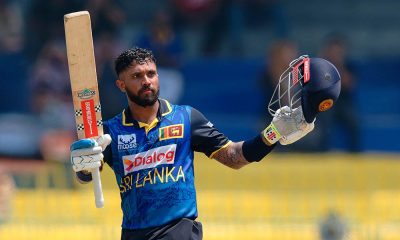
 Sports6 days ago
Sports6 days agoRemarkable turnaround for Sri Lanka’s ODI team
-
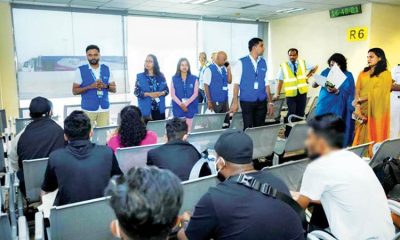
 Features6 days ago
Features6 days agoScammed and Stranded: The Dark Side of Sri Lanka’s Migration Industry
-
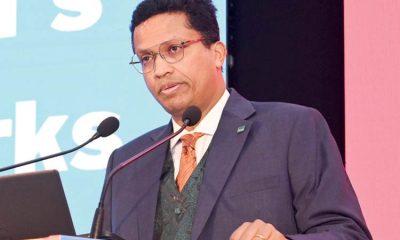
 Business6 days ago
Business6 days agoUN Global Compact Network Sri Lanka: Empowering Businesses to Lead Sustainability in 2025 & Beyond
-
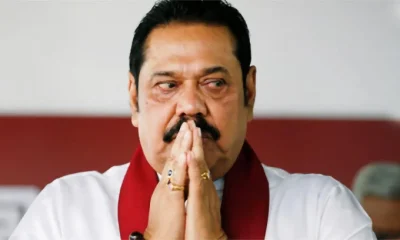
 Features5 days ago
Features5 days agoDon’t betray baiyas who voted you into power for lack of better alternative: a helpful warning to NPP – II
-

 News3 days ago
News3 days agoCommercial High Court orders AASSL to pay Rs 176 mn for unilateral termination of contract
-
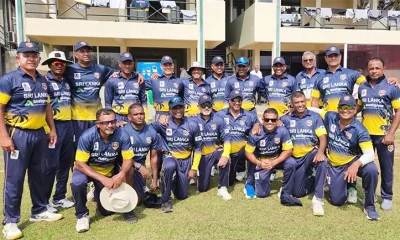
 Sports2 days ago
Sports2 days agoSri Lanka face Australia in Masters World Cup semi-final today
-
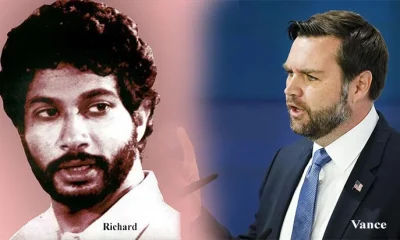
 Features5 days ago
Features5 days agoTwo films and comments
-
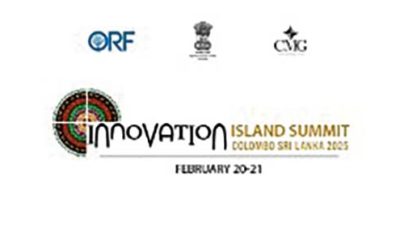
 News6 days ago
News6 days agoInnovation Island Summit 2025, Colombo, Sri Lanka











